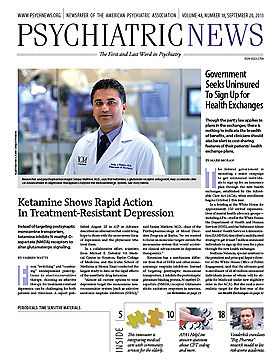Several studies have shown that depression is a risk factor for dementia. The same holds for diabetes. And when people who have diabetes are also depressed, their danger of developing dementia appears to be even greater than if they only have diabetes (Psychiatric News, July 6, 2012).
Now a new prospective study headed by Mark Sullivan, M.D., Ph.D., a professor of psychiatry and behavioral sciences at the University of Washington, confirms the earlier findings in a study published online August 14 in JAMA Psychiatry.
Sullivan studied approximately 3,000 middle-aged and older individuals with type 2 diabetes who were being treated at 52 clinics throughout the United States and Canada. All of the subjects were evaluated for depression at the start of the study, as well as 20 months and 40 months later, with the nine-item Patient Health Questionnaire (PHQ-9), a well-validated diagnostic instrument for use in primary care settings. A score of 10 or more on the PHQ-9 has been shown to have a 77 percent sensitivity and 94 percent specificity to the diagnosis of major depression by a structured psychiatric interview.
Five percent of the subjects had a score of 10 or greater at all three time assessments. Five percent had a score of 10 or more at baseline, but less than 10 at the 20-month and 40-month assessments. Sixty-two percent never had a score of 10 or more, and 28 percent had other patterns or missing data. At baseline, as well as at 20 months and 40 months, the subjects were also evaluated with multiple tests that measure cognition.
Subsequently the researchers compared the 20-month cognitive test results of subjects who had scored 10 or more on the PHQ-9 at baseline with the test results of subjects who scored 9 or lower at baseline, taking possible confounders into consideration—for example, age and other demographic factors; a history of cardiovascular disease; body mass index; smoking or alcohol use; or whether they had been given glucose-lowering treatment, insulin treatment, blood pressure treatment, or lipid treatment for their diabetes.
The researchers also compared the 40-month cognitive test results of subjects who had scored 10 or more on the PHQ-9 at 20 months with the 40-month test results of subjects who had not scored 10 or more at 20 months.
At both of the follow-up assessments, subjects with a prior depression status were found to perform significantly more poorly on cognitive tests than subjects without such a status. And subjects who had scored 10 or more on the PHQ-9 both at baseline and at 20 months showed the greatest cognitive decline.
Sullivan told Psychiatric News that he was surprised by “how rapidly the cognitive decline developed, that it developed in all patient subgroups, and that it affected all cognitive domains.”
The findings have clinical implications for psychiatrists, Sullivan added. “In patients with diabetes, depression detection and treatment might be important for dementia prevention.”
A key factor that still needs to be studied is whether depression treatment might reduce the risk of dementia among individuals with comorbid depression and diabetes.
Although the means by which depression might contribute to cognitive decline and dementia in individuals with diabetes are unclear, Sullivan and his colleagues suggested possible explanations in their report. For example, both depression and diabetes are associated with systemic inflammation, decreased insulin sensitivity, and autonomic dysfunction, which might mediate the effects of depression on dementia risk. Alternatively, dysregulation of the hypothalamic-pituitary axis by depression might damage brain areas involved in cognition or decrease neurogenesis in areas essential for memory, such as the hippocampus.
The study was funded by the National Institutes of Health. ■
